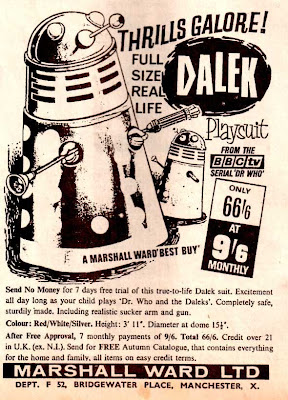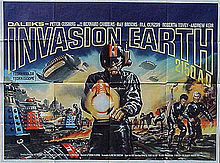"The Daleks" (also known as "The Mutants" and "The Dead Planet") Transmitted December 21 1963- February 1, 1964
Episode 1: The Dead Planet
Episode 2: The Survivors
Episode 3: The Escape
Episode 4: The Ambush
Episode 5: The Expedition
Episode 6: The Ordeal
Episode 7: The Rescue
Written by Terry Nation
Directed by Christopher Barry and Richard Martin
Producer: Verity Lambert
In "The Daleks" we are introduced to the most iconic of the Doctor's enemies:
 |
| The Doctor encounters the Daleks for the first time. Source of image: http://tardis.wikia.com/wiki/The_Daleks_%28TV_story%29 |
It is probably not an exaggeration to say that the Daleks are a BIG part of the reason why Doctor Who has reached its Golden Anniversary.
As I mentioned in an earlier post, in my opinion the previous serial "An Unearthly Child" holds up very well to viewing even after 50 years. A big part of that was due to the characterisations and performances of in particular the two lead actors, William Hartnell and William Russell. Throw in the fact that the Doctor and his granddaughter are mysterious alien beings who have been exiled from their (at this point unnamed) home planet and who are in possession of a machine that is "impossibly" bigger on the inside than on the outside and is capable of traveling ANYWHERE in time and space and I believe that there was enough of an indication after just one serial that Doctor Who had potential. But there was something missing! Some durable enemies perhaps?
What about the mutated descendants of an alien race, the result of a nuclear war that has almost destroyed their planet and that can only survive in life support machines shaped like giant pepper pots?
BRILLIANT! - We are on to a winner here!!!
And so, in defiance of the BBC's Head of Drama Sydney Newman's now legendary instructions "No Bug-Eyed Monsters!", the Daleks were born.
In "The Daleks", the TARDIS lands on an alien planet, Skaro, the home world of two races, the Daleks and the Thals, that has been devastated by a nuclear war between them. The radiation from the war has caused mutations to both races - as a consequence of these mutations the Daleks are now confined to armoured travel machines, which the Doctor later deduces are powered by static electricity, and limited to the boundaries of their metallic city. The mutation cycle has, in the words of the Doctor, "come full circle" for the humanoid Thals.
 |
| The Thals. Source of image: http://tardis.wikia.com/wiki/Thal |
As noted in my post on the preceding serial, "An Unearthly Child", there is a complexity to the Doctor's character in these early days of the series that is again evident in this serial. There are times when the Doctor is quite mischievous and selfish and almost seems to lack the sense of morality that we associate with the character later in time. For example, during their initial exploration of the petrified forest that the TARDIS has materialised in the travelers spot a metal city (the Dalek city) that the Doctor is keen to investigate but the others insist upon a return to the TARDIS.
 |
| The TARDIS crew spot the Dalek city. Source of image: http://tardis.wikia.com/wiki/The_Daleks_%28TV_story%29 |
On the way back to the TARDIS, Susan is separated from the others and frightened by what she insists was a human hand touching her on the shoulder. The others are skeptical. Once they are back in the TARDIS, strange knocking sounds and no trace of anybody outside on the TARDIS scanners provoke Ian, Barbara and Susan to insist that they leave the planet immediately. However, the Doctor, still keen to investigate the city, sabotages the TARDIS, preventing them from leaving. He claims (falsely) that mercury is needed for an essential component of the TARDIS - the fluid link, forcing the travelers to the city to look for some, eventually resulting in their capture by the Daleks.
At the city, Barbara is separated from the others and while looking for her the Doctor, Ian and Susan discover that the atmosphere of the planet is highly radioactive and that they've been walking around unprotected in it. Realising the gravity of the situation, the Doctor admits his sabotage and then suggests that they should leave immediately, abandoning Barbara! Such a suggestion would be completely out of the Doctor's character later in the series. Ian takes the fluid link hostage to ensure the Doctor helps him look for Barbara. When they are captured by the Daleks the fluid link is taken from Ian and it is the realisation of this when they escape from the city later in the serial, and the fact that they are stranded on Skaro without the fluid link, that leads them to try and convince the Thals of the need to fight.
Overall, "The Daleks" is another example of 60s Doctor Who that stands up pretty well almost 50 years later.
It is not difficult to see the relevance of "The Daleks" to the world in 1963. The Cuban Missile Crisis the previous year no doubt had the threat of nuclear conflict weighing heavily on people's minds. In "The Daleks" we see a world that has been devastated by such a conflict. In addition, the second world war was still well within living memory for most people. A memory of the war was ever-present in the films and comics of the era - and the Daleks were no exception. In one scene, writer Terry Nation has the Daleks rank up alongside each other, raise their right arms in a stiff salute (echoing the Nazi salute) and announce: "Tomorrow we will be the masters of this planet."
 |
| Notice any similarities between these two images? Source of Images (top): http://www.kasterborous.com/2012/06/010-the-dalek-invasion-of-earth/, (bottom): http://www.answers.com/topic/adolf-hitler-large-image |
The parallels between the Daleks and the Nazis grew bolder in later years. In "Genesis of the Daleks" (1975), traveling back in time, the Doctor (at this point played by Tom Baker) finds a pre-Dalek society where SS-style security officers wear jackboots, iron crosses and black shirts, and where High Command operates from a bunker. The newly created Daleks themselves are bred to be "racially pure".
'Dalekmania'
Despite these similarities (or perhaps because of them?) the Daleks turned out to be hugely popular with the viewing public. Not only did they ensure the success of the programme for years to come, they created a market for a vast array of merchandise.
 |
| Source of Image: http://www.richardwho.com/collectors/vuser/sub.asp?u=123&s=2 |
 |
| "Doctor Who's Astro-Ray Dalek Gun" Source of Image: http://tk.reddit.com/r/doctorwho/comments/16vdai/what_merchandise_would_you_like_to_see_for_the/ |
 |
| Dalek snowglobe. Source of Image: http://www.daleksoftheday.com/2011/08/1965-daleks-animated-snowstorm.html |
 |
| Dalek playsuit. Source of Image: http://grahamward.blogspot.co.nz/2011/01/i-am-dalek.html |
 |
| Cigarette Sweets (a different time indeed!). Source of Image: http://www.freewebs.com/recoveringthepast/apps/photos/photo?photoid=103853700 |
1965 saw the cinematic release of a Dalek movie in colour, "Dr. Who and the Daleks", starring Peter Cushing as a human scientist called Dr. Who. The screenplay was based on the Daleks first TV serial, described above.
 |
| Source: http://en.wikipedia.org/wiki/Dr._Who_and_the_Daleks |
The success of the film meant it was followed a year later by a second film, "Daleks - Invasion Earth: 2150 A.D.", based on the Daleks' second appearance in the TV series, "The Dalek Invasion of Earth" (1964).
 |
| Source of Image: http://en.wikipedia.org/wiki/Daleks_%E2%80%93_Invasion_Earth:_2150_A.D. |
And finally, it feels appropriate to sign off with a Youtube clip of one of my latest Doctor Who related acquisitions - a Desktop-patrol Dalek - a Christmas present from my sister Natasha:
50 years later and the Dalek merchandising machine is still going strong! :-)
Bye for now,
Nick.


No comments:
Post a Comment